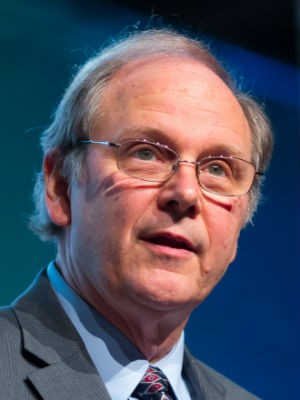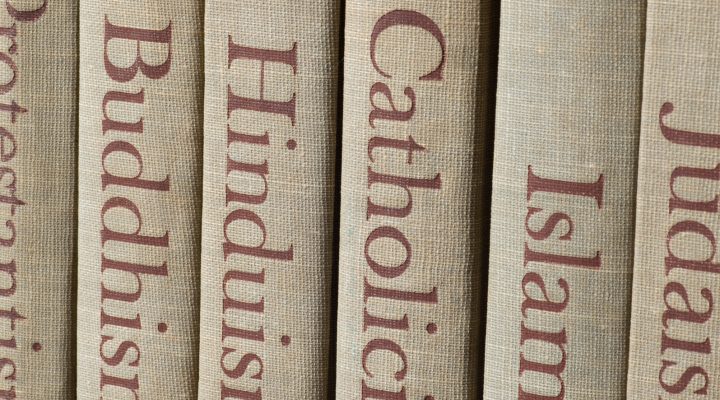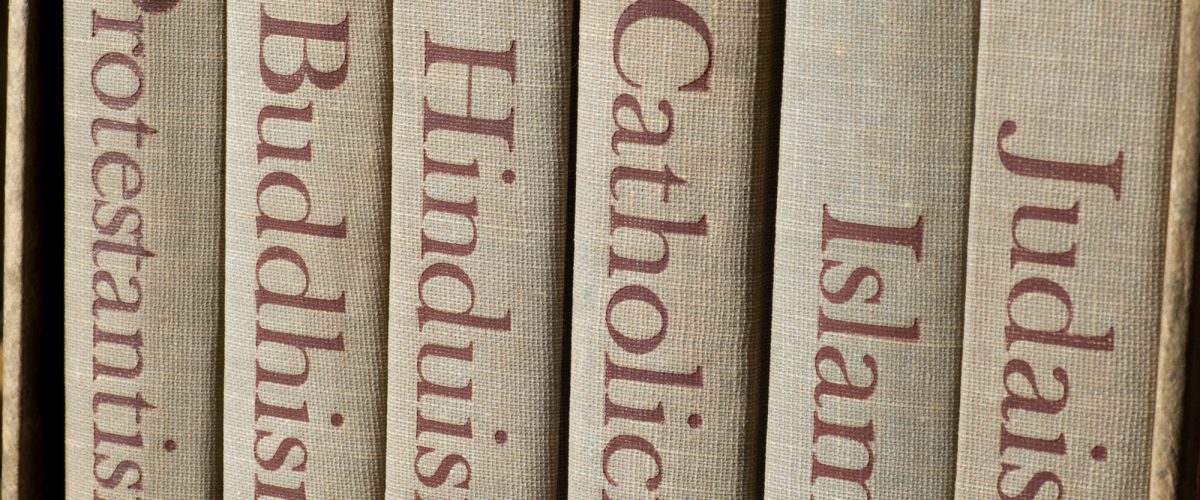The world’s religions intrigue me. This fascination is a benefit of my having lived on the island of Java for a quarter century, immersed in a culture enriched by religious pluralism.
My appreciation for religious difference also is tied to two of my personal friends, academic mentors and spiritual muses — Baptist John Jonsson and Methodist Diana Eck — dedicated Christians who made the study of the world’s religions their life’s work.

Robert Sellers
Previously I have written about my gratitude for being a member of the human family with those who walk other religious paths than I. Despite our different approaches to the divine, our lives are governed by the very same needs and marked by identical desires for the well-being of ourselves and our loved ones. Accordingly, I have a general humanistic appreciation for the traits we share in the human family, for regardless of religious or philosophical bent, we humans similarly desire happiness and loathe suffering. This kinship we share with “religious others” is one of three reasons why I respect diverse religions and spiritualities and the people who practice them.
Additionally, I find specific inspiration and instruction to support my regard for adherents of other religions. There is powerful biblical evidence that God views humans based upon their behavior more than their beliefs. Scriptures such as Genesis 1:31, Mark 7:24-30, Matthew 7:21, Matthew 25:331-46 and Acts 10:34-35 support this interpretation.
People who live according to the Jesus “way” of compassion, forgiveness, kindness, self-sacrifice, discipline, fidelity, constancy, orderliness, humility and respect will be acceptable to God. In the words of John 14:6, they will “come to the Father,” so I should accept them also and leave the decision to God.
“No person, regardless of religious identity, is qualified to decide who will experience God’s favor.”
In truth, God alone has the authority to judge the righteousness of all human beings. No person, regardless of religious identity, is qualified to decide who will experience God’s favor. I take these Scriptures seriously when they attest that one’s behavior is the basis for being acceptable to God. Thus, I believe those who do not call themselves Christians can also live authentically as human beings and exhibit the good and holy traits embodied by the man Jesus.
A third justification for my commitment to interfaith relations is my recognition that the major religions, despite their striking differences in doctrinal beliefs, nonetheless are remarkably similar in their ethical teachings.
In my encounters around the world with people who are followers of other religions, it is evident that their doctrinal convictions are different from mine. Nevertheless, many of them exhibit high ethical standards and live peacefully with their neighbors. Their Scriptures, stories and rituals are radically unlike the ones I cherish, yet many discover along their religious path enormous strength for their daily lives.
Interestingly, some of their ideas and practices have made me a better Christian. I also admit that the devotion, self-discipline and goodness of some of these people have challenged (and at times shamed) my spiritual maturity and moral character.
Ethical similarities
Stephen Prothero, professor of religion at Boston University, wrote a book in 2010 about religious diversity: God is Not One: The Eight Rival Religions that Run the World — and Why their Differences Matter. He begins by saying the world’s religious rivals diverge sharply on doctrine, ritual, mythology, experience and law, but they do converge around ethics.
“This does not mean all religions are the same. Their distinct doctrinal assertions are very important.”
This does not mean all religions are the same. Their distinct doctrinal assertions are very important.
“The most popular metaphor for this view (that all religions are basically the same) portrays the great religions as different paths up the same mountain,” Prothero says. This picture, however, does great disservice to the religions by portraying their destinations, or end goals, as the same — or, from a Christian perspective, salvation and entrance into heaven.
Mark Heim, a Baptist professor of theology at Yale Divinity School, argues there are not different paths up the same mountain, but separate paths up different mountains altogether.
To speak of the Muslim road to “salvation” or to debate whether the Buddha either went or failed to go to “heaven” is misinformed. Rather, in considering the different ends, or salvations, in other religions, one rightly speaks of Hindu moksha (“release from the cycle of rebirths”), Buddhist nirvana (“extinguishing of the flame of desire and the sense of self”), Muslim najat (“deliverance from the fires of hell to the pleasures of paradise by following God’s guidance”), Daoist dao (“the Way, or code of behavior in harmony with the natural order of the universe”), and Confucian ren (“benevolence or humaneness as the inner expression of social ideals”).
These end goals are the pinnacles of distinctly different “mountains,” insists Heim.
Applying my theory about the benefit of living the Jesus Way to these various religious end goals, I suggest that living with compassion and forgiveness garners good karma and aids the Hindu in the pursuit of moksha; that practicing kindness and self-sacrifice on behalf of others enables one to extinguish the flame of desire and the sense of self, thus helping Buddhists in their quest for nirvana; that exhibiting a life of discipline and fidelity assists the Muslim in approaching najat as he or she submits to Allah’s guidance and thus is more likely to be delivered from hell to paradise; that following a code of constancy and orderliness will direct one’s walking the dao, or Daoist Way; and that being characterized by humility and respect can undergird the inner expression of Confucian ren, the social ideals that mark true humanness.
Despite radical doctrinal differences Prothero so convincingly enumerates, the religions do converge on ethics. This also was the assessment of Huston Smith, perhaps the greatest American world religionist of the 20th century.
A cathedral of the spirit
Every time I have taught world religions for a university or seminary class, I have assigned to my students his beautiful text, The Illustrated World’s Religions: A Guide to our Wisdom Traditions. In this work, Smith explains he is interested in examining the best of each “enduring religion” which together comprise the “winnowed wisdom of the human race,” paths to the sacred whose spiritual teachings, distinct though mutually affirming, are like “stained glass windows that refract sunlight in different shapes and colors.”
Smith’s work was a revisioning of the view fostered in Aldous Huxley’s The Perennial Philosophy (1945) and Joseph Campbell’s The Hero with a Thousand Faces (1949). Smith agreed with his two friends that religions should not be divided into “two categories: the false ones and your own.”
“It is as if these various wisdom windows beautifully lighten the cathedral of the spirit.”
It is as if these various wisdom windows beautifully lighten the cathedral of the spirit. Describing these “stained glass” insights, Smith concludes:
Things are more integrated than they seem, they are better than they seem, and they are more mysterious than they seem; this is the vision that the wisdom traditions bequeath us. When we add to this the baseline they establish for ethical conduct and their account of the human virtues, one wonders if a wiser platform for human life has been envisioned.
British Roman Catholic author Karen Armstrong is even more explicit than Smith regarding the ethical oneness of the religions. First, she claims:
Religion is a practical discipline that teaches us to discover new capacities of mind and heart. … It is no use magisterially weighing up the teachings of religion to judge their truth or falsehood before embarking on a religious way of life. You will discover the truth — or lack of it — only if you translate these doctrines into ritual or ethical action.
Then, more recently, she identifies the one ethical behavior found in all religions:
All faiths insist that compassion is the test of true spirituality and that it brings us into relation with the transcendence we call God, Brahman, Nirvana, or Dao. Each has formulated its own version of what is sometimes called the Golden Rule. … Further, they all insist that you cannot confine your benevolence to your own group; you must have concern for everybody — even your enemies.
His Holiness the Dalai Lama, of Tibetan Buddhism, also highlights the common focus on compassion among the world’s religions:
The world’s major religious traditions each give the development of compassion a key role. Because it is both the source and result of patience, tolerance, forgiveness and all good qualities, its importance is considered to extend from the beginning to the end of spiritual practice.
Daniel Maguire, professor of ethics emeritus at Marquette University, posits an everyday analogy to help explain the importance of the ethical similarity among the religions in his 1993 book, The Moral Core of Judaism and Christianity: Reclaiming the Revolution. He maintains if representatives of the major religious traditions were all sitting around a table conversing, they never would agree on their doctrinal statements, the beliefs they cherish, but they would agree on their ethical admonitions, the behaviors they emulate.
Parliament of the World’s Religions
This convergence around ethical behavior is what has energized the Parliament of the World’s Religions, the world’s oldest international interfaith organization. Its original gathering at the World Columbian Exposition in Chicago in 1893 is acknowledged as the first time adherents of Eastern religions made public appearances in the West and as the birthplace of formal interreligious dialogue
One hundred years later, at the centennial celebration and first modern Parliament held in 1993, Hans Küng, a Swiss Catholic professor of theology in Tübingen, Germany, brought the draft of a document he had written that he called the “Declaration Toward a Global Ethic.” This was a statement he hoped would unite the world’s religions and spiritualities around the ethical concerns they already share. Küng wrote:
From the beginning, it was clear that a global ethic does not mean a new global ideology, or even an attempt to arrive at one uniform religion. The call for a global ethic does not aim to replace the supreme ethical demands of each individual religion with an ethical minimalism; it is not meant to take the place of the Torah, the Sermon on the Mount, the Qur’an, the Bhagavad Gita, the Discourses of the Buddha or the Sayings of Confucius. … It simply aims to make known what religions in (the) West and East, North and South already hold in common, but is so often obscured by numerous “dogmatic” disputes and intolerable self-(opinions). In short, the “Declaration Toward a Global Ethic” seeks to emphasize the minimal ethic which is absolutely necessary for human survival.
On Sept. 4, 1993, this “Global Ethic” was ratified as an official document of the Parliament of the World’s Religions and was signed by more than 200 leaders from 40 religions and spiritualities. The Declaration made the following assertions:
- A common set of core values is found in the teachings of the religions.
- There exist ancient guidelines for human behavior found in religious teachings which comprise the conditions for human sustainability and flourishing.
- Humans are interdependent; thus we must respect the community of people, animals and plants and work for the preservation of the earth.
- All of our decisions, behaviors and failures to act have consequences.
- We must treat others as we wish them to treat us.
- We consider humankind our family and so must not live for ourselves alone but should serve others.
- We must commit ourselves to a culture of nonviolence, respect, justice and peace.
- We must strive for a just social and economic order, where everyone has an equal chance to reach full potential as human beings.
Because I embrace these ethical values and commitments, which provide a framework for living productively in a pluralistic world, I feel a connection to the religions that endorse these ideals and directives.
Three conclusions
We live in a religiously plural age. I speak from experience and observation, because for many decades my life’s journey has brought me into relationships with people who follow other religions and spiritualities. I choose to treat these people with respect, admiration, curiosity and kindness because of three reasons.
First, we are all part of the same human family. These are my spiritual siblings, cousins and kinfolks, and I want to treat them well.
Second, various Scriptures prove to me that God accepts those who believe differently, yet who behave according to the example provided by Jesus. Therefore, I accept these people also.
Third, the major religions and spiritualities of the world converge around a core group of ethical commitments as actions that can create a more peaceful, just and sustainable world. I agree with these common ethical admonitions and strive to live according to their teachings.
I have acquired these theological interpretations after many years of rigorous education, living in Asia a quarter century, travel and work in 40-plus countries, teaching 20 years in American seminaries, profound soul-searching, hundreds of interreligious encounters, and numerous scars and wounds given me by Christians who don’t understand my views.
“We cannot live in a Bible Belt silo of Christian friends and narrow exclusivism, as if there aren’t millions of other people … who follow other paths.”
It is my conviction that in our increasingly pluralistic world, we all must decide how we feel about the religions and spiritualities practiced by others. We cannot live in a Bible Belt silo of Christian friends and narrow exclusivism, as if there aren’t millions of other people — good people of personal integrity, some of them living as our neighbors — who follow other paths.
The world’s religions are beloved by many people all around us. In such a world, how should we act? Huston Smith, missionary kid in China whom I have claimed as one of my heroes, tells what he did all his adult life:
Whether religion is, for us, a good word or bad; whether (if on balance it is a good word) we side with a single religious tradition or to some degree open our arms to them all, how do we comport ourselves in a pluralistic world that is riven by ideologies, sacred and profane? We listen.
My mentor and friend John Jonsson grew up in South Africa as a Baptist missionary kid and became fluent in Swedish, Norwegian, German, English, Afrikaans and Zulu. He was conversant in a total of 15 to 20 languages and dialects. When he began teaching at Baylor University in 1992, he was asked why he learned so many languages. John’s answer was surprising and profound: “I did not learn these languages in order to speak them. I learned so that I could listen.”
Listening to the symphony of sacred wisdom, so strikingly different yet remarkably similar — and learning from the people who revere this variety of perspectives — will enhance our lives more than we can imagine.
I am a disciple of Jesus, committed to loving God and my neighbors as I love myself. Many of my neighbors practice other religions or no religion at all, and while I am conversant in only two languages, I am determined to spend more of my time listening.
Rob Sellers is professor of theology and missions emeritus at Hardin-Simmons University’s Logsdon Seminary in Abilene, Texas. He is a past chair of the board of the Parliament of the World’s Religions in Chicago. He and his wife, Janie, served a quarter century as missionary teachers in Indonesia. They have two children and five grandchildren.
Related articles:
Six reasons why the ‘family of God’ is more inclusive than we have thought | Opinion by Rob Sellers
Six Scriptures undergirding my attitude toward other faiths | Opinion by Robert Sellers
Six lessons learned on my interfaith journey | Opinion by Robert Sellers
Lessons learned on a journey of interfaith friendship | Opinion by Robert Sellers


